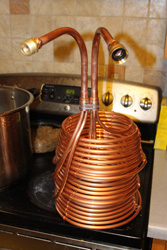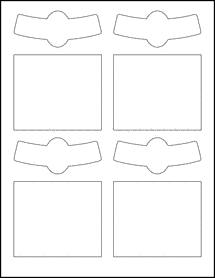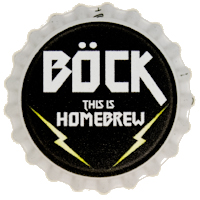Homebrew Dad's 16 Favorite Homebrewing Gift Ideas for Under $100
Folks, it's that time of year again. Christmas is right around the corner, and unsurprisingly, homebrewing forums are being inundated with posts asking for advice on gift ideas for that special home brewer in their life. Rather that try to be all things to all people, I've decided to simply give a list of some ideas based off of products that I personally have good knowledge of. In almost every case, I have limited the price of items on this list to under $100.
Full disclosure: I have an Amazon affiliate account. This means that if you click a link from my site to get to Amazon, I will receive a commission on anything you purchase there. The prices will be the exact same as if you had come from Google, so if you do enjoy Homebrew Dad.com, I would certainly appreciate you clicking one of my links or ads, regardless of what you may decide to purchase at Amazon.
All other items are simply those that I have used or know of people who have used; I receive no compensation for linking them.
1. Just Getting Started?


Maybe The person you are buying for isn't even brewing yet, but simply would like to be. This excellent starter kit ($90) will get them well on their way, as it comes with pretty much every essential item (outside of a large pot) to just get going in the hobby.
2. A Good Thermometer


Most homebrewing starter kits come with the old classic "floating thermometer". While it's certainly better than guessing, the bottom line is that those things are slow to give readings - and worse yet, they are often very inaccurate.
The absolute Cadillac of thermometers is the ThermoWorks Thermapen (pictured above). This fabulous device is splash proof and gives insanely accurate readings in three seconds. It's easy to calibrate (not that I've ever had to calibrate mine), and it folds up conveniently.
Not only do I use my Thermapen every single time that I brew or make a starter, but it has also revolutionized grilling steaks and chicken for me - to say that my family appreciates this would be an understatement. I cannot recommend this product enough.
Budget conscious alternative:
If you can't stomach $96 for a thermometer, consider the ThermoWorks RT600C. It's almost as accurate as the Thermapen, generates readings in five seconds, and is still water resistant. Better yet, it's a mere $16.
3. A Quality Chiller

One of the big challenges to brewing is in cooling your wort rapidly. There are several way to accomplish this, but one of the most effective is via an immersion wort chiller. Unlike some of the more expensive options out there (such as plate chillers or counterflow chillers), immersion chillers are easy to clean and maintain - you simply drop the chiller into your pot for the last ten minutes or so of your boil, which sanitizes it. When you are done, you rinse it off with hot water. Nothing to it!
The very best immersion chiller available (in my opinion) is the Hydra by JaDeD Brewing. Assuming that you treat it properly, the Hydra will chill your wort to ten degrees above your ground water temperature in as little as three minutes. I regularly read posted times of people managing to do so in around six minutes, even when using rather warm ground water. This is a truly outstanding product, one that would be welcomed by most brewers.
Budget conscious alternative:
Of course, the Hydra does have a fairly hefty price tag of $155, making it the one exception on this list of gift items under $100. If that is out of your budget, you can still pick up a serviceable immersion chiller for as little as $47. If you treat it right, you can get your beer down to pitching temperatures in 15-20 minutes with a chiller like this (I have used a near identical model for two years) - which is still absolutely worth doing.
Regardless of the chiller you use, know that if you are going to be using it inside, you'll need to buy an adapter for your kitchen faucet, as these chillers are made to work with normal garden hose sized inlets.
4. Easy Gravity Samples


I can't even begin to count the number of times that I've read posts of brewers moaning about the amount of beer that they waste when taking samples for gravity readings. It seems that a lot of people will siphon out (or use a turkey baster to draw up) beer into a cup or some sort of testing cylinder. When I read these, it always amazes me that they are not aware of the existence of the FermTech thief.
All you do is lower the cylinder into your bucket or carboy; this process fills the device with beer. You pull it out, then drop your hydrometer inside of it. Voila, a simple reading! Better yet, this method takes a fraction of the beer that other sampling methods require.
The thief runs around $12 or so, making it a great stocking stuffer.
5. Get a Handle on Your pH

While water chemistry and pH are not really a big deal for extract brewers, those who brew all grain will sooner or later discover the importance of the subject. Yes there are pH testing strips for sale, but quite honestly, they are of limited to no real use in brewing, as they are simply not sensitive enough for the application.
The Omega PHH-7011 is a superb piece of equipment. It generates readings quickly, the readings are extremely accurate, the device is easy to calibrate, and the electrode can be replaced - which means that this meter should last for years. While it is certainly not cheap (it sells for $99 directly from Omega, and they do not stock it for resale at external vendors such as Amazon), it is actually an excellent bargain, as this meter comes with a carrying case, storage solution, and the necessary calibration solutions (which are a must have for any pH meter, and normally cost extra to purchase).
Budget conscious alternative:
The Hanna HI 98107 is a nice alternative with a lot of great reviews, and this meter is less than half the price - currently $40 (with free shipping) at Amazon.
6. A Custom Mash Paddle

If you are an all grain brewer, you need to have an effective way to stir your mash. While a large spoon or whisk will absolutely do the job, a traditional mash paddle just feels right.
These custom paddles are crafted from a single piece of solid 3/4" maple, and the quality of the work is outstanding. My wife gave me one of these for Christmas in the past, and it's quite honestly a gift that I will treasure for a lifetime - and better yet, it's a functional gift that I use every single time that I brew.
A mash paddle from this vendor is available in three basic designs, is custom engraved, and costs $75.
7. BeerSmith Software

If you have any interest whatsoever in recipe design, BeerSmith is absolutely indispensable. The program allows you to easily run through "what if?" scenarios - i.e. if you add this grain, swap in these hops, change your mash temperature in this way... what will it do to my beer? Recipes are saved in a catalog, and the software has multiple invaluable utilities built in. I have often stated that BeerSmith is possibly the best $27 I have ever spent in brewing.
8. Silicone Tubing


For whatever reason, vinyl tubing is the default for homebrewing applications (siphoning, draining, pumping, etc). The thing is, vinyl tubing sucks. It coils up, it's rigid, and if it gets dirty? Good luck getting it truly clean.
Silicone tubing, on the other hand, is amazing. It's flexible. It has no memory whatsoever - which means that you never have to deal with coiling and kinking. And if it gets dirty, it's no big deal - silicone is typically rated for use at up to 500 degrees F, which means that it doesn't flinch at being boiled for sanitizing.
Yes, silicone does cost more than vinyl; you can expect to pay $2-$3 per foot for it. However, it will outperform and outlast vinyl tubing many times over, making it far less expensive in the long run. Once you use silicone, you will never again be happy with vinyl. Note that most homebrewers will need 3/8" ID (inside diameter) tubing, though some might use 1/2" ID.
9. A Stirplate


If you are using liquid yeast, you need to be making a starter every single time. While you can do this without a stirplate, you will get drastically better results with one. While I build my own, a DIY project isn't exactly a gift idea - so instead, check out the Stir Starter, one of the industry leaders in homebrewing stirplates.
Retail on the Stir Starter is $57, which is a nice deal. Do note that you will need an Erlenmeyer flask to go with this (2 liter version runs around $16.50).
10. Upgrade that Kettle


If you are looking to jump to all grain brewing, you'll need a bigger kettle than the 3-6 gallon pot that you probably started with. Most five gallon batches of beer have you collecting seven plus gallons of wort, which then expands during the boil - meaning that you really need at least a ten gallon pot to brew five gallons of all grain beer.
I personally own the Bayou Classic 1044 44 Quart stainless stockpot, and I could not be happier with it. 44 quarts is 11 gallons, which means that I have plenty of space and never have to worry about boil overs. The pot is sturdy, heats well, and has never given me issues with hotspots or the like - I heartily recommend it.
Yes, there are far more expensive options out there; pots that come with ports, valves, sight glasses, etc. But for a basic, quality pot, I challenge you to find a stainless steel pot of this size that does a better job - and can compete with a price tag under $100 (as of the time of this posting, Amazon has this pot for $72 and free shipping).
Budget conscious alternative:
There's not a thing in the world wrong with going with an aluminum pot; while they may not be quite as sturdy, they are perfectly fine for brewing, and will yield beer every bit as good as a stainless pot will. The Winware Professional Aluminum 40-Quart Stockpot is a great alternative, and only costs $47. Do note that you need to boil water in any aluminum pot for an hour before you brew with it for the first time.
11. Move the Heat Outside


Another critical piece for most looking to move to all grain would be a way to get all of that liquid to boil - most kitchen stoves cannot handle the sheer volume of liquid you'll be dealing with. Or, you may be in a situation where the other people in the house don't enjoy the smell of brewing beer as much a you do.
The answer to both of these is a propane burner. Don't go with a turkey fryer, which creates one central jet of flame - it will get the job done, but you'll spend a ton on propane, as this is a very inefficient method.
Instead, go with a multi jet design (often called a banjo burner), such as you see on the Bayou Classic SQ14. I own this affordable burner (can be had for less then $50), and it does a fantastic job. The frame is very sturdy, the regulator works great - all told, you could do far worse than this excellent piece of gear.
12. Custom Glassware

Another fantastic gift my wife has given me in the past was a couple of pint glasses etched with my "brewery" name, year established, etc. There is little to match the satisfaction of pouring a great beer that you have brewed into a glass that was designed just for you.
Sadly, I don't know who the vendor was, but a quick Google search shows tons of vendors for custom glassware, many of which have no minimums. It seems that you can get custom glasses for $6 or less.
13. Extra Fermentors


It's a rare brewer that will ever claim that they have enough fermentors. After all one more carboy, better bottle, or bucket can always find a use!
Now, if the person you are shopping for only has one or two fermentors, by all means, consider a new carboy or bucket for them. But even if they do own several such fermentors, consider a two gallon bucket with a drilled lid. Why two gallons?
Because it is extremely simple for a brewer to brew a batch of beer that is, say, one extra gallon in volume - it's literally no extra effort. However, they can then pour that extra gallon into this handy little bucket, pitch a different type of yeast, and end up with two completely different beers - with almost no more overhead. If you try this one, you'll be hooked.
This particular bucket is $16 shipped.
14. Homebrewing Reading Material




To me, a good brewer is always interested in continuing to educate themselves. If you are interested in designing beers, these two books represent some of the best education you can possibly get.
Designing Great Beers has been my go to resource now for well over a year; anytime I start a new beer recipe, I look here first for direction and good starting points. Being able to compare your recipe to those who have won gold medals is invaluable, and the overviews of each style by Daniels are superb.
Experimental Homebrewing is a new book (one that I'm close to finishing, and will be reviewing here on the site), but I cannot say enough good things about it. The book is down to earth and humorous without veering into the silly, and is packed full of outstanding methods and processes - all the while, helping you to understand the "whys" behind the things that you are doing. Any brewer will be better off owning a copy of this one.
15. Custom Packaging


Many brewers are happy simply scribbling something on their lids and calling it a day. More power to them!
However, if you are interested in making your beer bottles look as good as the beers themselves taste, there is hope.
OnlineLabels.com sells excellent blank beer bottle labels. Use a graphics program like Photoshop or Gimp to work with their template, print the labels on a color laser or inkjet printer, then peel and stick the self adhesive labels. A pack of standard labels will cover 400 bottles, and costs $19. They also offer easily removable labels, high gloss options, and more.
To top it all off (no pun intended), go with custom bottle caps from Bottlemark.com. Upload any image (or choose from their extensive library), and they can turn it into a bottle cap. Their high quality caps range from thirteen to fifteen cents each, with no minimums on orders.
16. Amazon Prime
This is a gift that keeps on giving. The fact is, almost everything you might need to brew with can be purchased on Amazon at a fair price, and an Amazon Prime membership gives you free two day shipping. And, of course, you get access to Amazon's vast music, e-book, movie, and TV show libraries - tons of which are available on demand, for free.
gives you free two day shipping. And, of course, you get access to Amazon's vast music, e-book, movie, and TV show libraries - tons of which are available on demand, for free.
Permalink
Tags for this post: homebrewer, homebrewing, gift, ideas, gifts, chiller, thermapen, pH meter, reading, books, amazon, glassware, mash paddle
1 Comments
I mentioned this on reddit recently, but if you're looking for a gift for a homebrewer and you don't know what they need, but you know they bottle their beer, a FastRack bottle rack is amazing and you can't have enough. Williams Brewing has the best deal on them because they give you a bonus rack for only slightly more.
posted by chino_brews on 12/12/2014 at 12:33:00 AM
Full disclosure: I have an Amazon affiliate account. This means that if you click a link from my site to get to Amazon, I will receive a commission on anything you purchase there. The prices will be the exact same as if you had come from Google, so if you do enjoy Homebrew Dad.com, I would certainly appreciate you clicking one of my links or ads, regardless of what you may decide to purchase at Amazon.
All other items are simply those that I have used or know of people who have used; I receive no compensation for linking them.
1. Just Getting Started?

Maybe The person you are buying for isn't even brewing yet, but simply would like to be. This excellent starter kit ($90) will get them well on their way, as it comes with pretty much every essential item (outside of a large pot) to just get going in the hobby.
2. A Good Thermometer

Most homebrewing starter kits come with the old classic "floating thermometer". While it's certainly better than guessing, the bottom line is that those things are slow to give readings - and worse yet, they are often very inaccurate.
The absolute Cadillac of thermometers is the ThermoWorks Thermapen (pictured above). This fabulous device is splash proof and gives insanely accurate readings in three seconds. It's easy to calibrate (not that I've ever had to calibrate mine), and it folds up conveniently.
Not only do I use my Thermapen every single time that I brew or make a starter, but it has also revolutionized grilling steaks and chicken for me - to say that my family appreciates this would be an understatement. I cannot recommend this product enough.
Budget conscious alternative:
If you can't stomach $96 for a thermometer, consider the ThermoWorks RT600C. It's almost as accurate as the Thermapen, generates readings in five seconds, and is still water resistant. Better yet, it's a mere $16.
3. A Quality Chiller

One of the big challenges to brewing is in cooling your wort rapidly. There are several way to accomplish this, but one of the most effective is via an immersion wort chiller. Unlike some of the more expensive options out there (such as plate chillers or counterflow chillers), immersion chillers are easy to clean and maintain - you simply drop the chiller into your pot for the last ten minutes or so of your boil, which sanitizes it. When you are done, you rinse it off with hot water. Nothing to it!
The very best immersion chiller available (in my opinion) is the Hydra by JaDeD Brewing. Assuming that you treat it properly, the Hydra will chill your wort to ten degrees above your ground water temperature in as little as three minutes. I regularly read posted times of people managing to do so in around six minutes, even when using rather warm ground water. This is a truly outstanding product, one that would be welcomed by most brewers.
Budget conscious alternative:
Of course, the Hydra does have a fairly hefty price tag of $155, making it the one exception on this list of gift items under $100. If that is out of your budget, you can still pick up a serviceable immersion chiller for as little as $47. If you treat it right, you can get your beer down to pitching temperatures in 15-20 minutes with a chiller like this (I have used a near identical model for two years) - which is still absolutely worth doing.
Regardless of the chiller you use, know that if you are going to be using it inside, you'll need to buy an adapter for your kitchen faucet, as these chillers are made to work with normal garden hose sized inlets.
4. Easy Gravity Samples

I can't even begin to count the number of times that I've read posts of brewers moaning about the amount of beer that they waste when taking samples for gravity readings. It seems that a lot of people will siphon out (or use a turkey baster to draw up) beer into a cup or some sort of testing cylinder. When I read these, it always amazes me that they are not aware of the existence of the FermTech thief.
All you do is lower the cylinder into your bucket or carboy; this process fills the device with beer. You pull it out, then drop your hydrometer inside of it. Voila, a simple reading! Better yet, this method takes a fraction of the beer that other sampling methods require.
The thief runs around $12 or so, making it a great stocking stuffer.
5. Get a Handle on Your pH

While water chemistry and pH are not really a big deal for extract brewers, those who brew all grain will sooner or later discover the importance of the subject. Yes there are pH testing strips for sale, but quite honestly, they are of limited to no real use in brewing, as they are simply not sensitive enough for the application.
The Omega PHH-7011 is a superb piece of equipment. It generates readings quickly, the readings are extremely accurate, the device is easy to calibrate, and the electrode can be replaced - which means that this meter should last for years. While it is certainly not cheap (it sells for $99 directly from Omega, and they do not stock it for resale at external vendors such as Amazon), it is actually an excellent bargain, as this meter comes with a carrying case, storage solution, and the necessary calibration solutions (which are a must have for any pH meter, and normally cost extra to purchase).
Budget conscious alternative:
The Hanna HI 98107 is a nice alternative with a lot of great reviews, and this meter is less than half the price - currently $40 (with free shipping) at Amazon.
6. A Custom Mash Paddle

If you are an all grain brewer, you need to have an effective way to stir your mash. While a large spoon or whisk will absolutely do the job, a traditional mash paddle just feels right.
These custom paddles are crafted from a single piece of solid 3/4" maple, and the quality of the work is outstanding. My wife gave me one of these for Christmas in the past, and it's quite honestly a gift that I will treasure for a lifetime - and better yet, it's a functional gift that I use every single time that I brew.
A mash paddle from this vendor is available in three basic designs, is custom engraved, and costs $75.
7. BeerSmith Software

If you have any interest whatsoever in recipe design, BeerSmith is absolutely indispensable. The program allows you to easily run through "what if?" scenarios - i.e. if you add this grain, swap in these hops, change your mash temperature in this way... what will it do to my beer? Recipes are saved in a catalog, and the software has multiple invaluable utilities built in. I have often stated that BeerSmith is possibly the best $27 I have ever spent in brewing.
8. Silicone Tubing

For whatever reason, vinyl tubing is the default for homebrewing applications (siphoning, draining, pumping, etc). The thing is, vinyl tubing sucks. It coils up, it's rigid, and if it gets dirty? Good luck getting it truly clean.
Silicone tubing, on the other hand, is amazing. It's flexible. It has no memory whatsoever - which means that you never have to deal with coiling and kinking. And if it gets dirty, it's no big deal - silicone is typically rated for use at up to 500 degrees F, which means that it doesn't flinch at being boiled for sanitizing.
Yes, silicone does cost more than vinyl; you can expect to pay $2-$3 per foot for it. However, it will outperform and outlast vinyl tubing many times over, making it far less expensive in the long run. Once you use silicone, you will never again be happy with vinyl. Note that most homebrewers will need 3/8" ID (inside diameter) tubing, though some might use 1/2" ID.
9. A Stirplate

If you are using liquid yeast, you need to be making a starter every single time. While you can do this without a stirplate, you will get drastically better results with one. While I build my own, a DIY project isn't exactly a gift idea - so instead, check out the Stir Starter, one of the industry leaders in homebrewing stirplates.
Retail on the Stir Starter is $57, which is a nice deal. Do note that you will need an Erlenmeyer flask to go with this (2 liter version runs around $16.50).
10. Upgrade that Kettle

If you are looking to jump to all grain brewing, you'll need a bigger kettle than the 3-6 gallon pot that you probably started with. Most five gallon batches of beer have you collecting seven plus gallons of wort, which then expands during the boil - meaning that you really need at least a ten gallon pot to brew five gallons of all grain beer.
I personally own the Bayou Classic 1044 44 Quart stainless stockpot, and I could not be happier with it. 44 quarts is 11 gallons, which means that I have plenty of space and never have to worry about boil overs. The pot is sturdy, heats well, and has never given me issues with hotspots or the like - I heartily recommend it.
Yes, there are far more expensive options out there; pots that come with ports, valves, sight glasses, etc. But for a basic, quality pot, I challenge you to find a stainless steel pot of this size that does a better job - and can compete with a price tag under $100 (as of the time of this posting, Amazon has this pot for $72 and free shipping).
Budget conscious alternative:
There's not a thing in the world wrong with going with an aluminum pot; while they may not be quite as sturdy, they are perfectly fine for brewing, and will yield beer every bit as good as a stainless pot will. The Winware Professional Aluminum 40-Quart Stockpot is a great alternative, and only costs $47. Do note that you need to boil water in any aluminum pot for an hour before you brew with it for the first time.
11. Move the Heat Outside

Another critical piece for most looking to move to all grain would be a way to get all of that liquid to boil - most kitchen stoves cannot handle the sheer volume of liquid you'll be dealing with. Or, you may be in a situation where the other people in the house don't enjoy the smell of brewing beer as much a you do.
The answer to both of these is a propane burner. Don't go with a turkey fryer, which creates one central jet of flame - it will get the job done, but you'll spend a ton on propane, as this is a very inefficient method.
Instead, go with a multi jet design (often called a banjo burner), such as you see on the Bayou Classic SQ14. I own this affordable burner (can be had for less then $50), and it does a fantastic job. The frame is very sturdy, the regulator works great - all told, you could do far worse than this excellent piece of gear.
12. Custom Glassware

Another fantastic gift my wife has given me in the past was a couple of pint glasses etched with my "brewery" name, year established, etc. There is little to match the satisfaction of pouring a great beer that you have brewed into a glass that was designed just for you.
Sadly, I don't know who the vendor was, but a quick Google search shows tons of vendors for custom glassware, many of which have no minimums. It seems that you can get custom glasses for $6 or less.
13. Extra Fermentors

It's a rare brewer that will ever claim that they have enough fermentors. After all one more carboy, better bottle, or bucket can always find a use!
Now, if the person you are shopping for only has one or two fermentors, by all means, consider a new carboy or bucket for them. But even if they do own several such fermentors, consider a two gallon bucket with a drilled lid. Why two gallons?
Because it is extremely simple for a brewer to brew a batch of beer that is, say, one extra gallon in volume - it's literally no extra effort. However, they can then pour that extra gallon into this handy little bucket, pitch a different type of yeast, and end up with two completely different beers - with almost no more overhead. If you try this one, you'll be hooked.
This particular bucket is $16 shipped.
14. Homebrewing Reading Material


To me, a good brewer is always interested in continuing to educate themselves. If you are interested in designing beers, these two books represent some of the best education you can possibly get.
Designing Great Beers has been my go to resource now for well over a year; anytime I start a new beer recipe, I look here first for direction and good starting points. Being able to compare your recipe to those who have won gold medals is invaluable, and the overviews of each style by Daniels are superb.
Experimental Homebrewing is a new book (one that I'm close to finishing, and will be reviewing here on the site), but I cannot say enough good things about it. The book is down to earth and humorous without veering into the silly, and is packed full of outstanding methods and processes - all the while, helping you to understand the "whys" behind the things that you are doing. Any brewer will be better off owning a copy of this one.
15. Custom Packaging


Many brewers are happy simply scribbling something on their lids and calling it a day. More power to them!
However, if you are interested in making your beer bottles look as good as the beers themselves taste, there is hope.
OnlineLabels.com sells excellent blank beer bottle labels. Use a graphics program like Photoshop or Gimp to work with their template, print the labels on a color laser or inkjet printer, then peel and stick the self adhesive labels. A pack of standard labels will cover 400 bottles, and costs $19. They also offer easily removable labels, high gloss options, and more.
To top it all off (no pun intended), go with custom bottle caps from Bottlemark.com. Upload any image (or choose from their extensive library), and they can turn it into a bottle cap. Their high quality caps range from thirteen to fifteen cents each, with no minimums on orders.
16. Amazon Prime
This is a gift that keeps on giving. The fact is, almost everything you might need to brew with can be purchased on Amazon at a fair price, and an Amazon Prime membership
Permalink
Tags for this post: homebrewer, homebrewing, gift, ideas, gifts, chiller, thermapen, pH meter, reading, books, amazon, glassware, mash paddle






Please support BrewUnited by using our Amazon affiliate link when doing any shopping there - be it for homebrewing or for your regular shopping!
1 Comments
I mentioned this on reddit recently, but if you're looking for a gift for a homebrewer and you don't know what they need, but you know they bottle their beer, a FastRack bottle rack is amazing and you can't have enough. Williams Brewing has the best deal on them because they give you a bonus rack for only slightly more.
posted by chino_brews on 12/12/2014 at 12:33:00 AM

